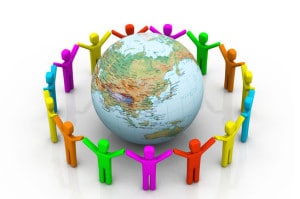I’ve been asked to take part in Pavarti K. Tyler’s wonderful Celebrating Community Blog Hop this week. Yesterday I posted a favorite recipe, something to share with a key community: my family. Today, I’m talking about what community means to me. I’ve taken a slightly different approach and talked about the breakdown of community. Many seem to believe that community is an old-fashioned concept. I disagree. Look around and you’ll see communities in your work, your family, your neighborhood. How we behave within those communities can impact our lives – and the lives of others – profoundly.
Community: Far From An Old-Fashioned Concept
An ugly war has erupted between reader/book reviewers and authors over the legitimacy of negative reviews. While people on both sides have made valid points, there are also those on both sides who seem to find it acceptable to substitute a hate-filled attack for civil discourse.
In part, the system – permitting people to post anonymously; resulting, as Roger Waters might put it, in the bravery of being out of range – invites such hatefulness. But it’s more than this. The same rudeness pervades ordinary life. Too often we operate as if we’re on the defense. As Cersei Lannister, the queen in the Game of Thrones tells her son, ‘Anyone who isn’t us is our enemy.’
 The breakdown of community-the loss of vital social connections-is, I believe, the root cause of, as I see it, a disheartening increase in hostility. Fifty years ago, most of us were born, lived and died in one community. Even in cities, typically divided into neighborhoods, communities consisted of a network of immediate and extended family, friends, neighbors, coworkers, church, members, and other groups. We knew-indeed, we were often on speaking terms with-the local firefighters, police, doctors, teachers, pharmacists, etc., who served us.
The breakdown of community-the loss of vital social connections-is, I believe, the root cause of, as I see it, a disheartening increase in hostility. Fifty years ago, most of us were born, lived and died in one community. Even in cities, typically divided into neighborhoods, communities consisted of a network of immediate and extended family, friends, neighbors, coworkers, church, members, and other groups. We knew-indeed, we were often on speaking terms with-the local firefighters, police, doctors, teachers, pharmacists, etc., who served us.
These tight-knit communities had well-defined codes of conduct. Members could choose: follow the rules or be ostracized. Because of the inherent familiarity, miscreants were easily caught. The Internet has created a new, broader sense of community. Yet, for all its merit, without the familiarity, without face-to-face interaction, the loyalty that once tied us together has been lost.
The weakening of community has unmoored us, severing the relationship between behavior and accountability. In tight-knit communities, fearing the judgment of people we loved or admired, we typically subjugated small group-e.g., family or church-preferences to those of the larger community. We are more apt to be rude to people we don’t know and believe we’ll never see again or we’ll never meet in real life-the person sitting next to us on a plane, the customer service agent, someone we’ve met only online-than to intimates who will hold us accountable.
We now move in pods-within a self-selected group of family, friends, or social networks. Each small group develops and maintains its own code of conduct-thus, bullies stick together; as in any community, we comply with the code or risk alienation. Striving for acceptance, we control our behavior within the small group. Mean Girls bully the studious peer, never their own. The problem is, small group ethics don’t always adhere to the standards of the community at large.
On the Internet, anonymity shields us, but it also makes us feel small and, to some degree, lost; feeling defenseless, we are more likely-spurred on by our group-to mount an attack. I don’t care to return to the past. A minimal standard of decency, reinforced by sanctions against those who refuse to comply (as we now shame misogynists, for example)-now, that would be nice.
Perhaps the perfect way to achieve this is to remember the sentiment of this wonderful video. Though you only see the computer screen, behind it is a real person just like you. Remembering that it’s all about people is surely the first step in creating – and maintaining – our communities.



This certainly needs to get out there Big Time. Unfortunately, there will always be bullies (small people who’ve got serious issues) and the Internet gives them a big ‘ole soap box with no real means of reproach.
I love that video – it's a really good reminder. I sometimes miss the fact that my parents don't live closer. I'm an only child and my cousins are spread out all over the country. I'd love that nostalgic idea of community, but it just doesn't exist anymore in the same way. And when i look at it without the rose colored glasses i think it's a good thing. i was always the black sheep, always labeled by my small town family growing up by things I said and did years before, never allowed to grow up. i look so much like my mother relatives would struggle to remember my name. Without those constraints and expectations I've learned how to be myself and realize who I really am. now I have a community who can see me for the light that's mine. Maybe someday my family will be able to do the same.
[…] Terri Giuliano Long August 18: (Eid): Share your favorite community/family photo, and tell us the story behind it. – […]